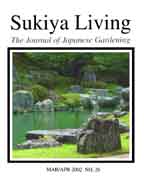|
The
“Zen Garden” Term
In January 2002 we reviewed a book by Wybe
Kuitert and introduced JOJG readers to his important research on the
so-called “Zen garden” topic. We thought we’d solicit a few more opinions on
the subject. Here's what they had to say when we asked a few experts
the following question:
“What do you think about the term, “Zen garden?”
 Tim
Hansken
Tim
Hansken
Many JOJG readers are older than the term “Zen garden.” As some
already know, the first author to use the words “Zen” and “garden” in the
same sentence was probably an American woman, Loraine Kuck, in her 1935 book
“100 Gardens of Kyoto.” Her neighbor, a writer and teacher of Zen, likely
planted the seed in her mind. She then went on to become the Madame
Blavatsky of Japanese gardens.
Until the 1950’s no historical work or garden book in Japan ever spoke of
“Zen-like” gardens. Now, however, the term is a salable commodity, eagerly
taken up by both Western and Japanese writers. Historically, Zen monks of
the Sotoh sect completely rejected such luxurious things as gardens. Muso, a
Zen monk and creator of gardens for the Ashikaga shogunate, made a name for
himself as a garden builder, but at the time he was excoriated by other Zen
monks. One monk wrote, criticizing him: “People practicing Zen should not
construct gardens.” He went on to say that Muso’s gardens were far removed
from the meaning of the sutra.
Tim Hansken is an Asian linguist and garden builder from Occidental, CA.
 Tamao Goda
Tamao Goda
In Japan, gardening is an everyday topic, just like cooking or
commuting to one’s job. Zen Buddhism, on the other hand, is a very remote
topic. Few Japanese people ever even think about Zen. We do visit gardens
located at temples to enjoy scenes of seasonal beauty. We go there mainly
because temple gardens are open to the public, unlike the gardens at private
homes. If there is a restaurant that has a great garden, we go there, too.
In Japan, most temples have limited financial resources. Some have learned
to generate extra income through tourism, promoting the “Zen garden” fad
which apparently attracts Westerners and some Japanese tourists as well. I
do not blame cash-strapped temples for using their gardens as tourist bait,
but it is sad that foreigners so quickly swallow the stories told by temple
caretakers (the monks).
I’m afraid that our very casual attitude toward religion has created some
confusion. We love gardens, and we visit temples, but that does not mean
that we think gardens are related in some way to Buddhism. I’m very sorry
that Westerners have this misconception, and it’s probably time to start
correcting this problem. In my mind, there is no such thing as a “Zen”
garden.
Why do some people feel the need to “spice up” Japanese gardens by linking
them to religion or mysticism? The truth is actually more profound. The
simple, nature-inspired beauty of a Japanese garden can stand on its own as
a feature of ordinary life, and it can be enjoyed by all people of any
religion.
Tamao Goda is JOJG’s art director and chief Japanese garden researcher.
 Bardwell
Smith
Bardwell
Smith
When we talk about the Carleton College garden, we do not tell our
listeners what it or any garden “means.” We do not even say it is
necessarily a Japanese garden, though it is clearly influenced by Japanese
garden aesthetics. To tell people what it means is to impose a certain
meaning upon it, which then preempts what they may perceive on their own.
The mistake of informing visitors in this fashion also occurs frequently in
Japan. As one recalls from the Tao Te Ching by Lao Tzu, “Look, it cannot be
seen - it is beyond form. Listen, it cannot be heard - it is beyond sound.
Grasp, it cannot be held - it is intangible.” In other words, the potential
meaning is so vast and so varied that to ascribe specific meanings is to
stifle the imagination and to silence one’s capacity for quiet listening.
The deepest forms of listening, of course, are to one’s own inner spirit,
and as one does this what one hears changes over time. Therefore, assigned
labels such as “Zen garden” disturb one’s genius for experiencing nature
freshly again and again.
Prof. Bardwell Smith is Professor Emeritus of Asian Studies at Carleton
College.
 Kendall
H. Brown
Kendall
H. Brown
The term “Zen garden” was coined in the mid-twentieth century and as
such tells us more about modern ideas than it does about the Japanese
gardens it purports to describe. Its use often indicates an ahistorical and
essentializing approach to Japanese culture - the attempt to find one true
style and meaning in what is a complex and even contradictory history. The
term is used broadly to mean many things: gardens at Zen temples, stone
gardens, minimalist gardens, gardens with strong spiritual implications, and
so on. In current usage, the term is so broad as to be almost meaningless as
analysis or even description. Like a slogan or cliche used to advertize a
spurious product, the term sounds appealing but in fact delivers little. It
is misleading to use “Zen garden” to refer to style because gardens at Zen
temples were designed in different styles. Similarly, many types of gardens
have spiritual implications. When we refer to gardens at Zen temples, we are
better off calling them “gardens in a Zen context.”
Ken Brown is an author and professor of Asian art history at Cal State
Long Beach.
 J.
Skuba
J.
Skuba
The label “Zen garden” is a bogus appellation attached to a serious
art form. It is a hijacked term. Beatniks of the 50’s and the flower-child
hippies of the 60’s used the word in a vague descriptive manner. To them it
was “far-out,” “cool,” and “oh-wow.” 40 years later the term is still being
mis-applied, only now it is used in mainstream venues and as advertising
copy for all kinds of New Age gizmos.
In the true meaning of the word, Zen Buddhism is a serious and rigorous
religion. Zen seeks to conceal emotion and transmute it into internal energy
through practicing a rigid discipline, which then ultimately accesses a
strong and lofty spirit.
Japan’s dry gardens are thought to have crystallized a new art form by using
natural materials to create a different world of abstract forms and spatial
compositions. Human emotion is deliberately expressed in the art form. It is
a mistake, then, to apply the term “Zen” to such gardens. Zen has nothing to
do with garden styles or fashion statements, and it’s time we stop using the
term inappropriately.
J. Skuba is an artist and garden builder in Lake Forest, Illinois.
 Steve Beimel
Steve Beimel
The so-called “Zen aesthetic” refers to what began with the stoicism
of Japan’s Kamakura era. Zen, which was popular amongst the samurai class,
encouraged a simple lifestyle. Though minimalist design was born out of Zen
simplicity, it does not necessarily follow that minimalist works of art are
“Zen art.” For example, it would be illogical to say, “Zen encouraged
simplicity. Dry gardens are simple. Therefore, dry gardens are Zen gardens.”
Dry gardens are sometimes considered expressions of Zen philosophy. Zen says
that truth cannot be learned from others, but must be discovered internally.
Therefore using the term “Zen garden” (or “Lutheran garden,” etc.), actually
contradicts Zen philosophy, since it superimposes a philosophical meaning
from the outside and artificially prejudices people’s subjective
interpretations. This limits the experience of the viewer, rather than
letting him see truth with the preferred, unprejudiced eyes of a child.
Ironically, dropping the word “Zen” as a defining label brings it closer to
the freedom of Zen than using it.
Steve Beimel is the head of Esprit Travel and editor of The Kyoto Diary.
 Asher Browne
Asher Browne
My first reaction on reading this question was, “What a silly thing
to ask.” Then I remembered how things are in the Japanese garden world
outside of Japan, where many of the English-language books on the subject
try to promote the so-called “Zen garden” topic to some extent or another.
This may be hard for people to believe, but the truth is that for three
years I have been working full-time for Japanese garden companies here in
Kyoto, and in that entire time I have never heard the term “Zen garden” used
by any of my co-workers.
Of course there are many beautiful gardens at temples. Professional
gardeners work on them, scholars write about them, and tourists visit them.
Indeed, temple gardens offer a great opportunity for all of us to enjoy
beautiful gardens.
Here in Japan though, instead of viewing Buddhism and the gardens at temples
as somehow philosophically linked, most Japanese people simply see those
gardens as just that - gardens.
Asher Browne is an intern at a gardening company in Kyoto, Japan.
---------------------------------------------------------
ZEN GARDEN Check out this link for some surprising information about this often (mis)used term.

